I got the regular S8, like it way more than my ipad. Ipads have gotten boring and the S8's wide screen look alot better playing video too. The free keyboard that Samsung gave me for pre-ordering has been awesome too, typing on it feels like using a regular laptop. Really impressed with it. Apple needs to seriously upgrade iPadOS, its gotten really boring. Also the Spen on the tab S8 works better overall than the Apple pen because it works throughout the OS almost like a mouse. Good job Sammy.
Got a tip for us?
Let us know
Become a MacRumors Supporter for $50/year with no ads, ability to filter front page stories, and private forums.
Samsung's Galaxy Tab S8 Ultra vs. Apple's iPad Pro
- Thread starter MacRumors
- Start date
- Sort by reaction score
You are using an out of date browser. It may not display this or other websites correctly.
You should upgrade or use an alternative browser.
You should upgrade or use an alternative browser.
No knock to android, I don’t think it’s a problem for many consumers but it is a problem for me. I personally prefer the iOS experience so much more to the point of choosing hardware that’s not as right for me. Mostly due to ecosystem and how all my devices stay in sync when I stay iOS, also how fluid and beautiful everything is, but also my research has shown me most android streaming apps don’t support HDR (Disney+, HBO Max to name a few) which makes that gorgeous display useless to me, because it runs android. If it had ran windows instead, it would have been an instant buy from me.This is a really tired argument. Android isn’t a problem anymore. If you have any experience with some of the latest android devices, you’d know that it’s actually pretty fluid and secure. The only gripe that someone might raise, it’s just it doesn’t match the longevity of software updates that Apple does.
But just because it’s ‘Android’, doesn’t make it less any other desirable to the consumer. It really comes down to choice of platform of what somebody prefers.
Last edited:
There aren’t many optimized apps for Android Tablet compares to iPadOS as there aren’t many optimized games for macOS compares to Windows.
It doesn’t matter how good the hardware is, the thing that will forever set iPad and other tablets apart is app parity.
GarageBand, Shapr3D, Pages, Keynote, iMovie, Procreate, Pixelmator, Scaniverse, Concepts, Pencil It In etc etc. There is nothing on Android of this quality for a tablet and whilst there is not Samsung’s tablets will always be consumption devices rather than productive ones.
GarageBand, Shapr3D, Pages, Keynote, iMovie, Procreate, Pixelmator, Scaniverse, Concepts, Pencil It In etc etc. There is nothing on Android of this quality for a tablet and whilst there is not Samsung’s tablets will always be consumption devices rather than productive ones.
It most certainly is a problem on tablets. Apps are glitchy and under optimized, the tablet multitasking is dogwater, and the layout doesn’t make good use of the bigger screen. It’s also a Samsung device, meaning updates will come months — if not years — late and only 2 yearly refreshes, compared to Apple that is rarely even late by 30 mins and offers a good 5-6 years of consistent updates.This is a really tired argument. Android isn’t a problem anymore. If you have any experience with some of the latest android devices, you’d know that it’s actually pretty fluid and secure. The only gripe that someone might raise, it’s just it doesn’t match the longevity of software updates that Apple does.
But just because it’s ‘Android’, doesn’t make it less any other desirable to the consumer. It really comes down to choice of platform of what somebody prefers.
Last edited by a moderator:
Actual dream come trueIf only the Samsung tablet could run a touch-capable version of MacOS.
The only thing the Samsung Galaxy is good for is keeping the heat on Apple to change some features. That’s it. Apps, speed and 3rd party accessories market is total domination in the. IOS favor.
Samsung in February unveiled the Galaxy Tab S8 Ultra, a high-end tablet that's meant to outshine the iPad Pro with its 14.6-inch OLED display. In our latest YouTube video, we went hands-on with Samsung's Galaxy Tab S8 Ultra to see if the company has indeed created something that's better than the 12.9-inch iPad Pro.
Subscribe to the MacRumors YouTube channel for more videos.
Priced starting at $899.99 for 128GB of storage and 8GB RAM, the Galaxy Tab S8 Ultra is more affordable than the $1,099 128GB 12.9-inch iPad Pro, even though it's bigger with its 14.6-inch AMOLED display. Apple's iPad Pro uses mini-LED technology, and both have the same 120Hz maximum refresh rate.
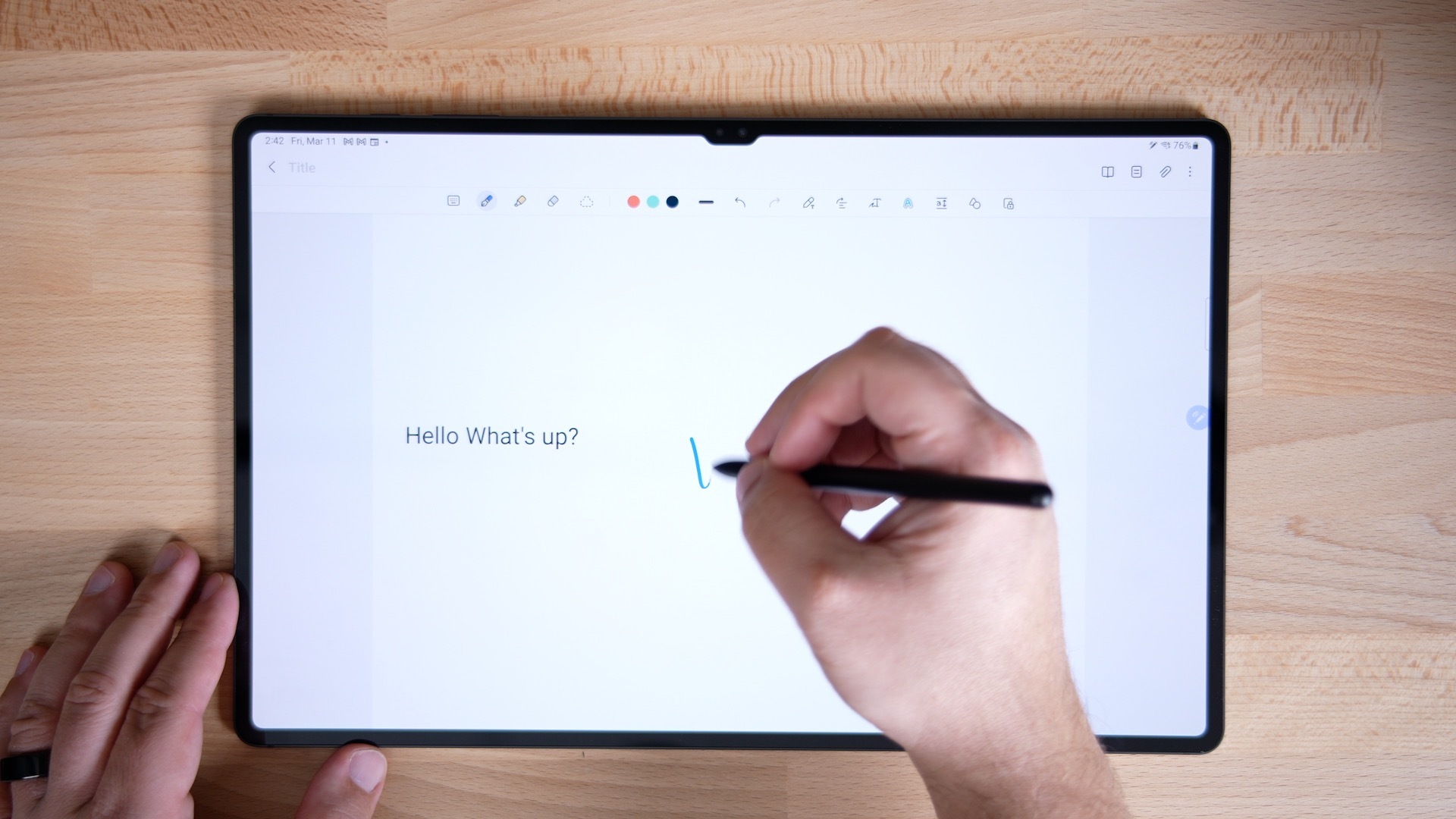
Samsung designed the Galaxy Tab S8 Ultra with slim bezels, but it's worth noting that there is a notch for the front-facing camera, even though Samsung has previously made fun of Apple for including a notch on some of its devices. Apple's iPads don't have a notch at this time, so Samsung is breaking ground on the tablet notch front.
Despite the notch, the Galaxy Tab S8 Ultra's display is its best selling point, and the OLED panel has an edge over the iPad Pro's mini-LED panel because of blooming, or light leakage that can cause some on-screen elements to have an unwanted glow effect when viewing high contrast content.
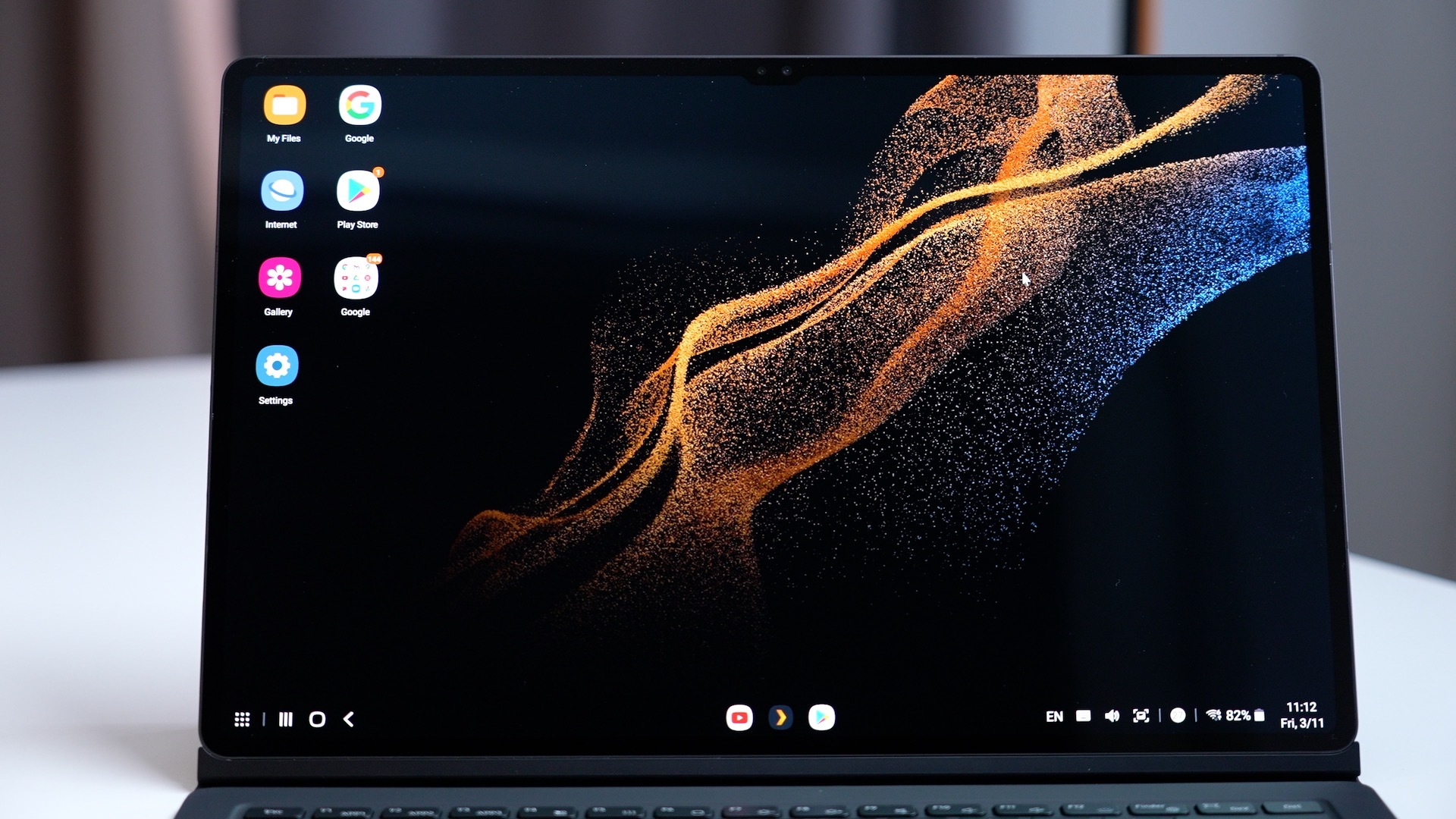
Samsung put the front camera on the Galaxy Tab S8 Ultra in a landscape orientation, which makes sense on a tablet this size as it's more of a desktop-like experience. The iPad Pro has the cameras positioned for use in portrait orientation, which is awkward on a larger display.

There is a built-in facial recognition system, but Android device makers have not mastered technology equivalent to Face ID, so it's limited in scope and can't be used for purchases or password authentication. Instead, there is a fingerprint reader built into the power button, similar to Apple's iPad Air.
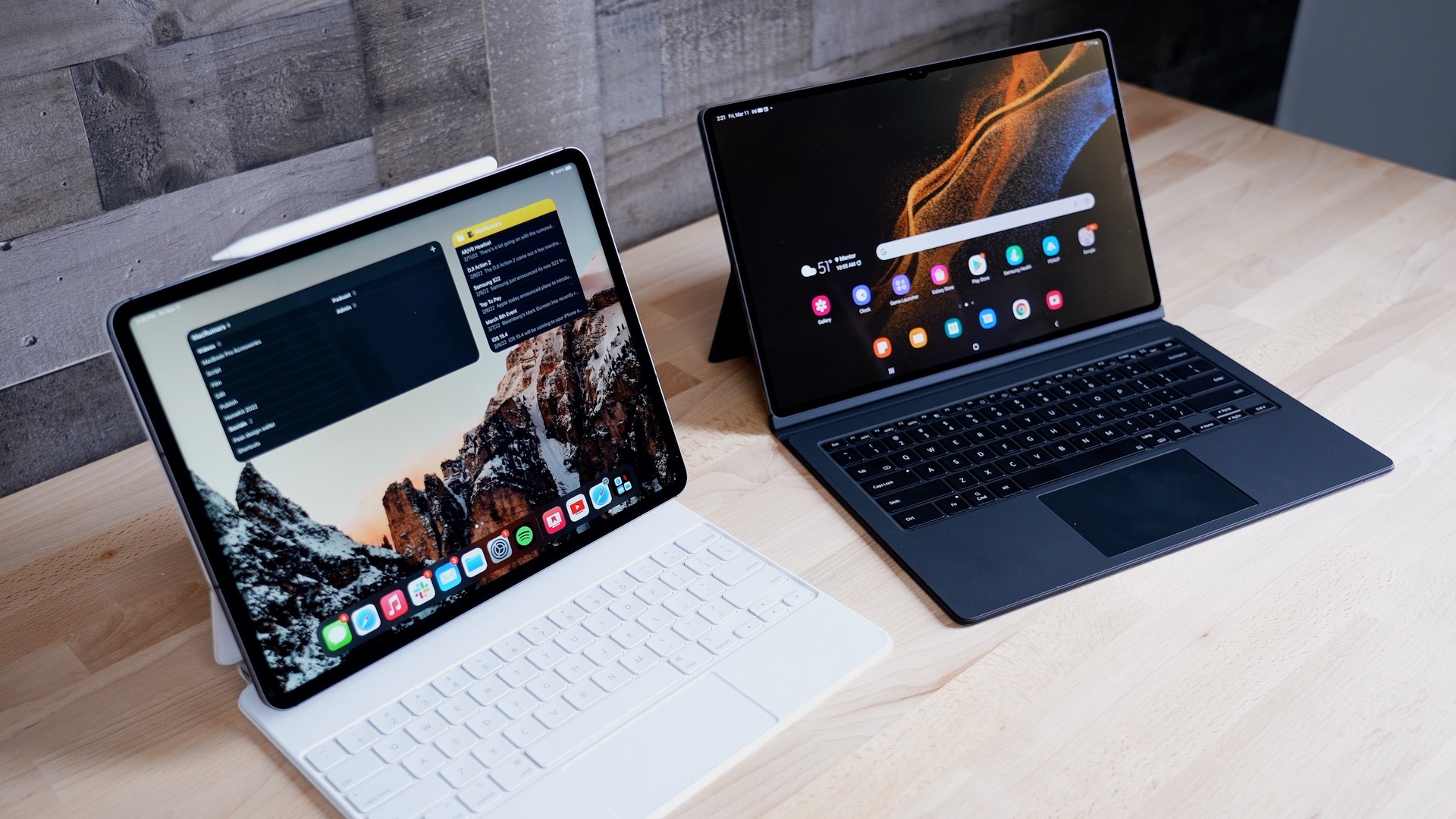
The iPad Pro has the Apple Pencil as an input device, and the Galaxy Tab S8 Ultra has the S-Pen, which is actually included in the box with the tablet so it doesn't require an extra purchase. The S-Pen is more feature rich than the Apple Pencil with air commands in addition to standard stylus support. Both the Apple Pencil and the S-Pen perform similarly, with minimal lag and the same palm rejection capabilities.
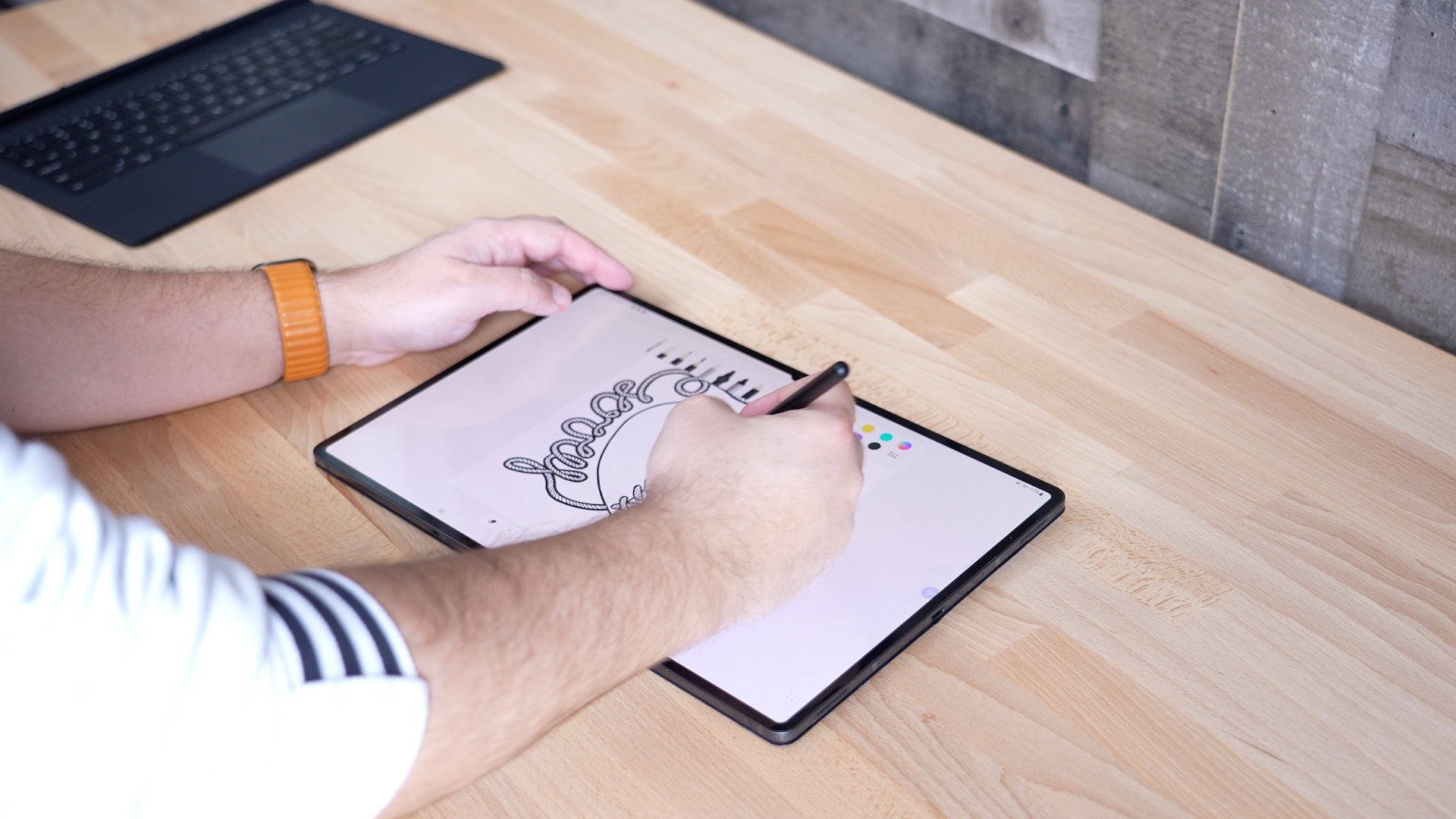
You can get a keyboard with a trackpad for the Galaxy Tab S8 Ultra for an extra $350. The keys are fine, but the trackpad is way behind Apple's Magic Keyboard in terms of usability. Battery life is similar, but Samsung offers 45W fast charging so it can charge up quicker.
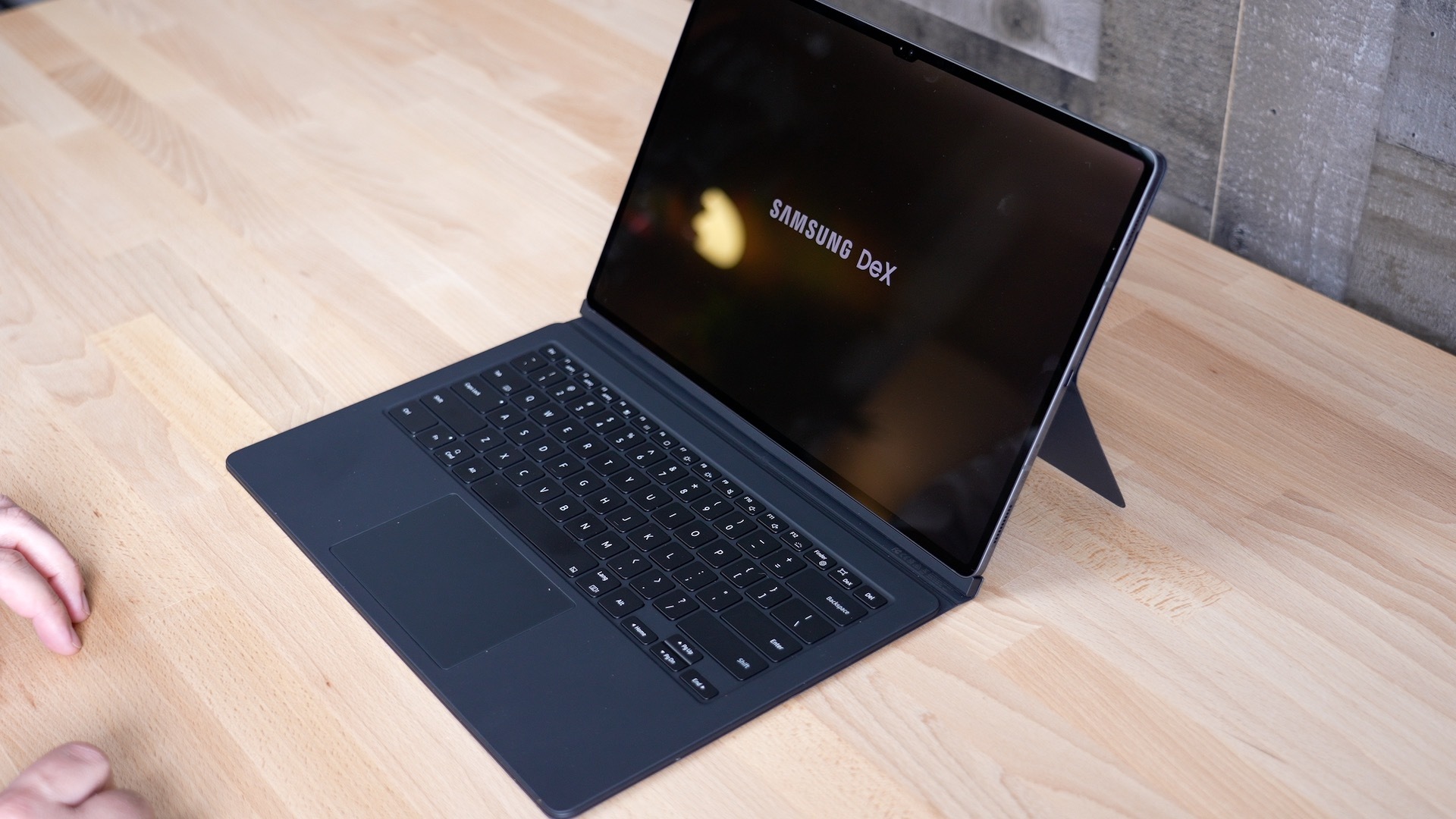
When it comes to hardware, the Galaxy Tab S8 Ultra and 12.9-inch iPad Pro are similar and are both excellent tablets, but software is what sets the two apart. The iPadOS operating system could offer a better desktop experience, but it still outshines Samsung's Android-based tablet software. Apps don't always work properly, the scale is off, and there are several other issues.
Samsung did develop DeX for a better desktop multitasking experience, and it's similar to something like Chrome OS with a dedicated dock, but it's still not a full computer replacement, much like the iPad Pro. As for performance, the M1 chip is significantly faster, and there's no real competition.
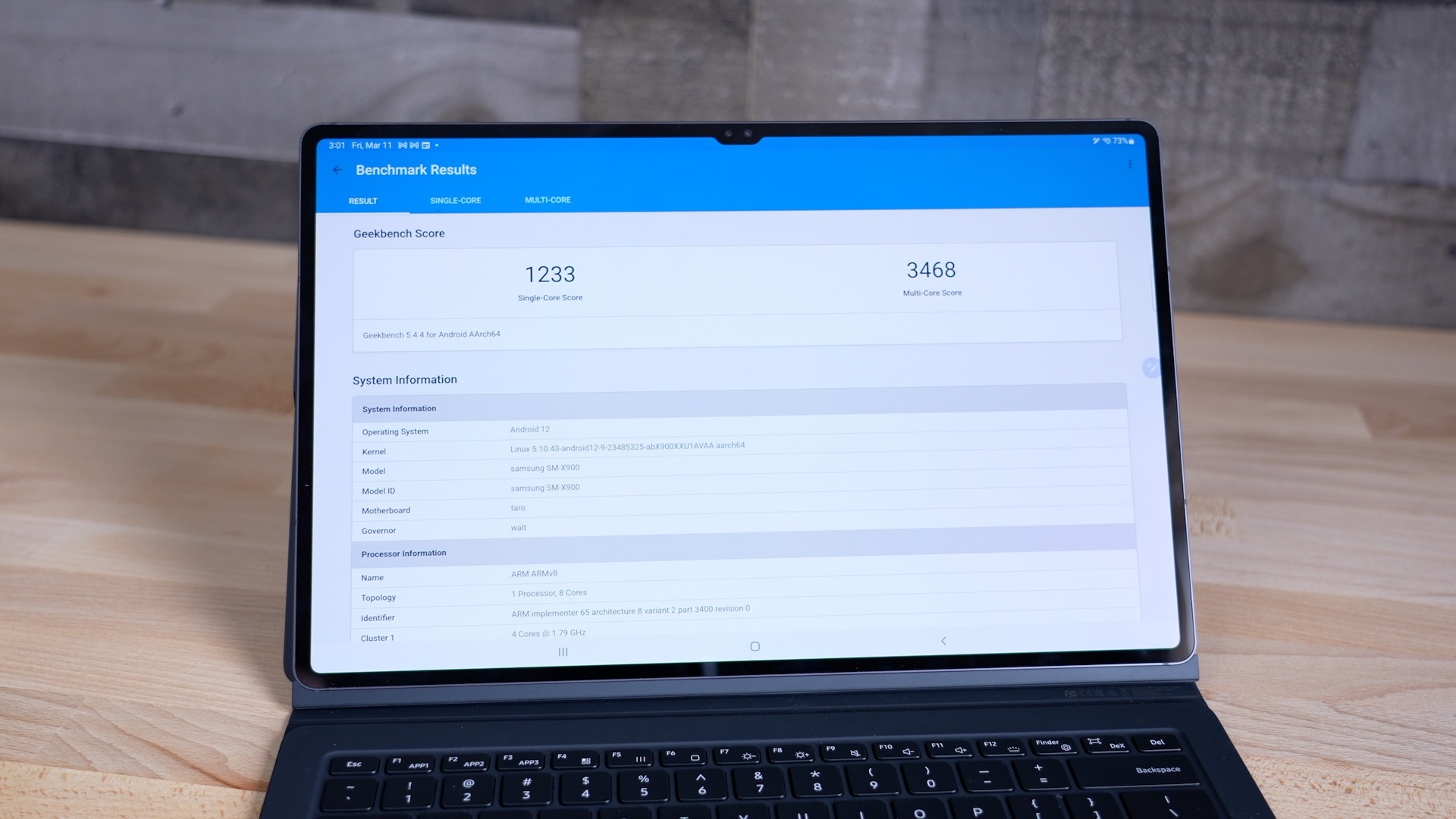
All in all, the iPad Pro wins out because of the software experience and the M1 chip's performance, but ecosystem is an important factor. No dedicated Samsung user is going to want to pick up an iPad, and the same goes for Apple device users who are locked into Apple's ecosystem.
Have you tried out the Samsung Galaxy Tab S8 Ultra? Let us know in the comments.
Article Link: Samsung's Galaxy Tab S8 Ultra vs. Apple's iPad Pro
16:9 is super awkward for a tablet, Glad apple stuck to 4:3.
It’s actually 16:10. The short side is virtually the same length as the iPad, and the long side is ~18% longer.
If you use your iPad only for videos, then you need to get something else.
If you want OLED, there aren’t a lot of alternatives.
I have an S7 and while I like android, the app selections are really hurting. No design suite that’s up to point like my iPad pro 
Also ripped into them about not including a charger in the box for their phones.And didn't Samsung rip into Apple about notches on a smartphone... and they have one on a tablet?
We all know what happened next….
Before reading the article: “Let me guess… ‘It really depends on which operating system you’re used to and prefer’”
After reading the article: “Why did I waste these few minutes of my precious life when I already knew the answer”
After reading the article: “Why did I waste these few minutes of my precious life when I already knew the answer”
This is a really tired argument. Android isn’t a problem anymore. If you have any experience with some of the latest android devices, you’d know that it’s actually pretty fluid and secure. The only gripe that someone might raise, it’s just it doesn’t match the longevity of software updates that Apple does.
But just because it’s ‘Android’, doesn’t make it less any other desirable to the consumer. It really comes down to choice of platform of what somebody prefers.
It really isn't tired when discussing tablets. The biggest mistake Google made with Android is in regards to tablets and dumping Honeycomb and any updates to that. You've got the initial knock against iPads when they first came out going for them, indefinitely -- blown up phone apps.
Doesn't run iPadOS, so it's pretty much gimped out of the box. If it had a Windows 11 option, then might be worth it.
And didn't Samsung rip into Apple about notches on a smartphone... and they have one on a tablet?
I'm not sure how Windows would make it "better". 🤣 *shivers*
My only problem with Android is google. If only there was a viable alternative to youtube I would be google free…
The OLED screen and price are the two things it has over an iPad. Everything else is second place, the two biggest being the screen dimensions are biased towards consumption rather than productivity, the apps are mostly phone apps.
IpadOS is all that is holding iPad back and that is up to Apple to fix, but once fixed it will apply globally to all iPads, not just new ones. Real file management, windowing, and multiuser accounts and it would be pretty hard to best.
I do like the landscape camera for larger iPads though.
IpadOS is all that is holding iPad back and that is up to Apple to fix, but once fixed it will apply globally to all iPads, not just new ones. Real file management, windowing, and multiuser accounts and it would be pretty hard to best.
I do like the landscape camera for larger iPads though.
“If you had any experience with android..” he says to a person who just reviewed a android tablet… he brought receipts as to why he felt that way.This is a really tired argument. Android isn’t a problem anymore. If you have any experience with some of the latest android devices, you’d know that it’s actually pretty fluid and secure. The only gripe that someone might raise, it’s just it doesn’t match the longevity of software updates that Apple does.
But just because it’s ‘Android’, doesn’t make it less any other desirable to the consumer. It really comes down to choice of platform of what somebody prefers.
I think there is lot of ignorance on Android system and the S8 offering.
Samsung has committed to provide OS updates for next 4 years (beyond Android 12 through end of 2026) and security updates through end of 2027. This kind of addresses the longevity issue to an extent with tablet good for next 5-6 yrs. Apple still will have edge through with 7-8 yrs of solid life span in general.
The App system in Android is actually not that horrible as far as day to day use is concerned. Google softwares in particular work pretty good. I understand that there is a bias to Apple softwares in this forum and in parts it is justified but Google has its strengths particularly here in India where it beats market competition hands down. I don't know if it is because Google India having a India specific focus. Also remember Google is about to release Android 12L which is expected to address some of the current scaling and optimization problems.
Overall iPad is still a superior device in terms of longevity and software optimization but Android/Samsung has minimised the gap with S8 series as far as day to day use is concerned. For business pros in finance and media professionals Apple will continue to rule though.
Samsung has committed to provide OS updates for next 4 years (beyond Android 12 through end of 2026) and security updates through end of 2027. This kind of addresses the longevity issue to an extent with tablet good for next 5-6 yrs. Apple still will have edge through with 7-8 yrs of solid life span in general.
The App system in Android is actually not that horrible as far as day to day use is concerned. Google softwares in particular work pretty good. I understand that there is a bias to Apple softwares in this forum and in parts it is justified but Google has its strengths particularly here in India where it beats market competition hands down. I don't know if it is because Google India having a India specific focus. Also remember Google is about to release Android 12L which is expected to address some of the current scaling and optimization problems.
Overall iPad is still a superior device in terms of longevity and software optimization but Android/Samsung has minimised the gap with S8 series as far as day to day use is concerned. For business pros in finance and media professionals Apple will continue to rule though.
Come on now. I doubt it’s flagged as spam. If it is you need a new system. It’s a U.K. printed mainstream newspaper.I’m not clicking on your link that’s flagged with spam. Maybe you should read your own links prior to listing them.
It’s a terrible awful tabloid - that’s true. But it’s a genuine website.
What's dogwater about multitasking on the Samsung tablets especially the newer uses? I have an S8+ that I can test out. When was the last time that you are informed on updates for Samsung S tablets? The S8 and future ones will get 4 years of OS updates and 5 years of security updates.It most certainly is a problem on tablets. Apps are glitchy and under optimized, the tablet multitasking is dogwater, and the layout doesn’t make good use of the bigger screen. It’s also a Samsung device, meaning updates will come months — if not years — late and only 2 yearly refreshes, compared to Apple that is rarely even late by 30 mins and offers a good 5-6 years of consistent updates.
As a former Android user I agree it’s gotten better over the years. But there are still some major issues (at least for me):This is a really tired argument. Android isn’t a problem anymore. If you have any experience with some of the latest android devices, you’d know that it’s actually pretty fluid and secure. The only gripe that someone might raise, it’s just it doesn’t match the longevity of software updates that Apple does.
But just because it’s ‘Android’, doesn’t make it less any other desirable to the consumer. It really comes down to choice of platform of what somebody prefers.
- Fragmentation of the system (not only the many different versions out there but also the manufacturer-specific customizations)
- Long term support (or lack thereof)
- Manufacturers rolling out OS updates seemingly at random (not for all devices that could run them, not in all regions, not in a timely manner)
- Reliance on Google
- As a developer I find the insane amount of different screen sizes and aspect ratios and not distinguishing between device type a pain in the ass for things like UI scaling
These are not points that bother every user, maybe not even a large number of users. They are, nevertheless, things that make me not want to use Android anymore.
Register on MacRumors! This sidebar will go away, and you'll see fewer ads.


